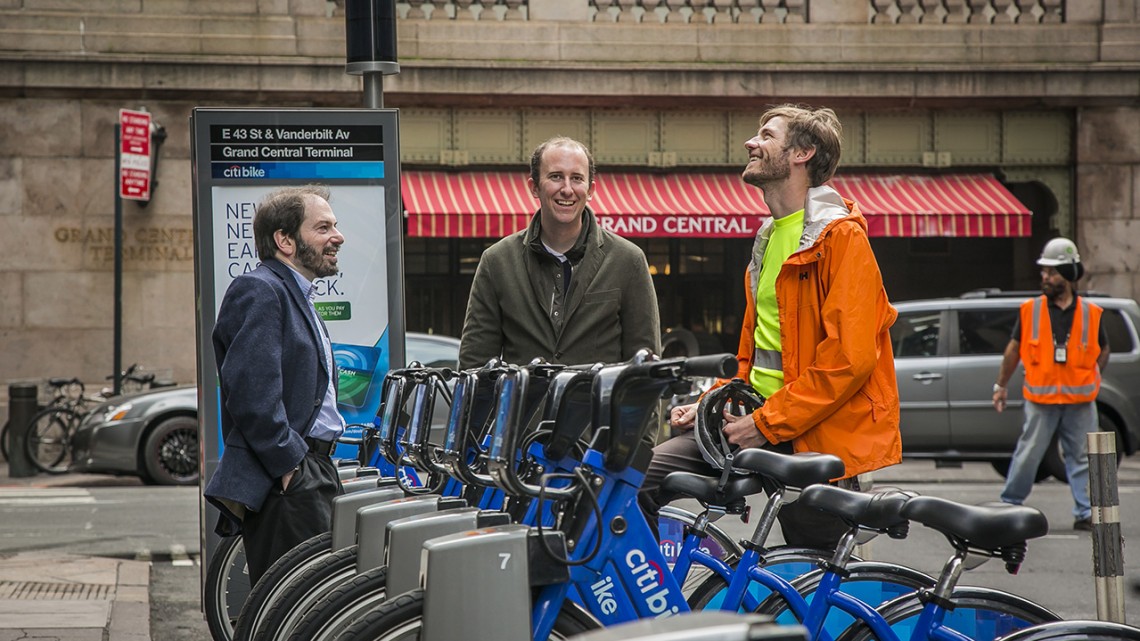
David Shmoys, left, Eoin O’Mahony Ph.D. ’15, center, and Citi Bike worker Kelly McGowan at a Citi Bike station in Manhattan. Research by Shmoys and his team has helped Citi Bike improve its operations.
With real-time decisions, Citi Bike breaks the cycle of empty stations
By Melanie Lefkowitz
Cornell research has improved bike sharing in New York and other cities, providing tools to ensure bikes are available when and where they’re needed through a crowdsourcing system that uses real-time information to make decisions.
Citi Bike redistributes its bicycles around New York City using a program called Bike Angels, based on research by David Shmoys, the Laibe/Acheson Professor of Business Management and Leadership Studies in the School of Operations Research and Information Engineering.
Through Bike Angels, which Shmoys helped Citi Bike develop three years ago, cyclists earn points adding up to free rides and other prizes by using or returning bikes at certain high-need stations. Originally, Bike Angels awarded points for the same pattern of stations every morning, and a different fixed pattern each afternoon rush; now the program uses an algorithm that continually updates the pattern of stations for which users earn points.
“The ability to make decisions that are sensitive to exactly what are today’s conditions enables us to be much more effective in assigning those points,” said Shmoys, who is also associate director of Cornell’s Institute for Computational Sustainability.
With co-authors Hangil Chung ’18 and Daniel Freund, Ph.D. ’18, Shmoys wrote “Bike Angels: An Analysis of Citi Bike’s Incentive Program,” a detailed report showing the effectiveness of this approach. The study received a Best Paper award at the June 2018 ACM SIGCAS Conference on Computing and Sustainable Societies.
Shmoys has been working with Citi Bike and its parent company, Motivate, for the past five years. Motivate operates the largest bike-sharing programs in the U.S., including in San Francisco, Chicago and Boston.
Because of commuting patterns, residential neighborhoods face shortages of bicycles in the morning rush, while New York City neighborhoods like the Financial District and Midtown are more likely to run out of bikes in the evening. Similarly, parking docks can be full at certain hours, making it difficult or impossible for users to return the bikes when they’ve reached their destinations.
Historical user patterns offer a lot of information about where shortages or full docks are likely to occur, but real-time assessments perform even better, Shmoys and his team report. The analysis shows that Citi Bike should make decisions in 30-minute intervals to avoid changing incentives while users are in the process of responding to them.
“There’s a tradeoff, because your algorithm is less responsive by making different decisions at discrete blocks of time and, therefore, could be doing suboptimal things,” Shmoys said. “But you’re meeting the expectations of your user base, and that’s an important thing in terms of sustained effectiveness.”
Before Bike Angels, Citi Bike redistributed, or rebalanced, bicycles primarily using trucks – an imperfect solution, since progress was slow through Manhattan’s traffic-choked streets and trucks use fossil fuels.
Since it began in 2016, Bike Angels has been embraced by Citi Bike users, some of whom make it a hobby to earn points and work their way up the leaderboard, where the initials of high scorers are posted.
“Bike Angels has taken off in a way that we never imagined,” Shmoys said. “Now we’re rewarding users for doing things that we know help the system.”
Ford GoBike in San Francisco, operated by Motivate, has also adopted the Bike Angels system – which Shmoys discovered when he was invited to become one of their initial members during his spring 2018 sabbatical in Berkeley.
Shmoys’ paper outlining the full range of the multi-year collaboration with Motivate, “Analytics and Bikes: Riding Tandem with Motivate to Improve Mobility” – co-authored with Freund, Eoin O’Mahony, PhD. ’15 and Shane Henderson, professor and director of the School of Operations Research and Information Engineering – was named a finalist in the 2018 INFORMS Wagner Prize for Excellence in Operations Research Practice.
The Cornell work also suggested using data to figure out which stations needed more parking docks and which could get by with fewer. Hundreds of docks have been moved in New York City and Chicago based on this work, Shmoys said.
In a video about the collaboration, Motivate CEO Jay Walder said Cornell’s research helped the company shift from making decisions by intuition to making decisions with data.
“In a prior life, I ran the [Metropolitan Transportation Authority], which is the largest public transit organization in the U.S., and I often tell people that the analytical process of doing bike share is actually more complicated than the analytics of running the MTA,” Walder said. “The work with Cornell was … really about giving us an analytical foundation to be able to make some of the decisions that were most critical to what we were doing.”
The collaboration with Motivate is a great example of an effective partnership between academia and the private sector, Shmoys said.
“It took several years and persistence, but it did lead to change that helped the system to improve,” he said. “Bike sharing is an amazing piece of moving cities to a more sustainable foundation. Cities are being congested by cars and other fossil fuel-driven vehicular traffic, and more extensive use of bikes as a means of personal transport is a great step forward.”
The research was funded in part by the National Science Foundation.
Media Contact
Get Cornell news delivered right to your inbox.
Subscribe
